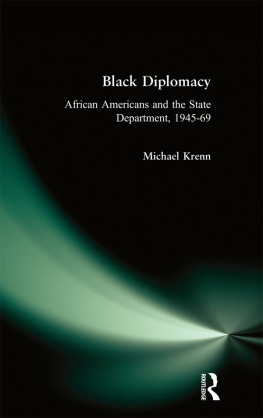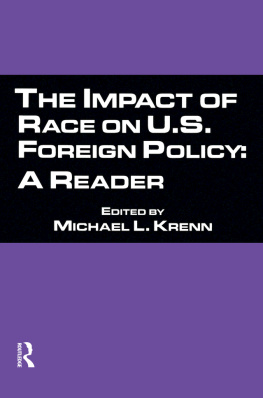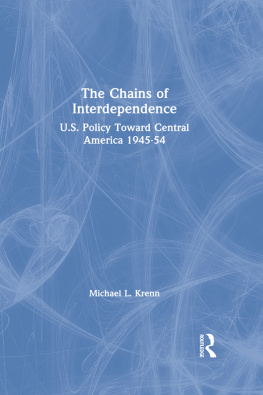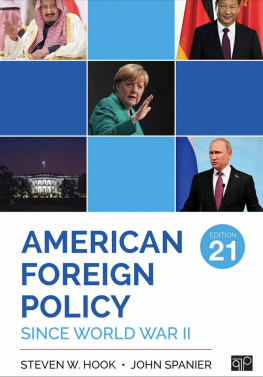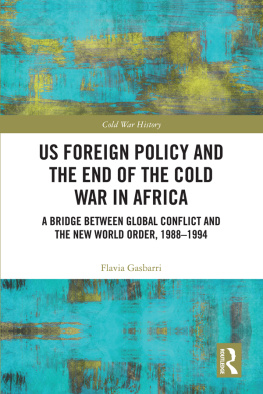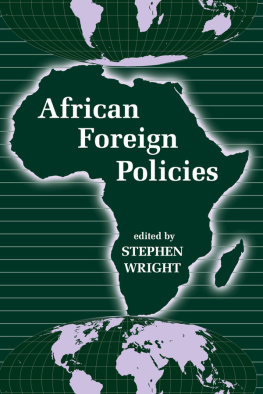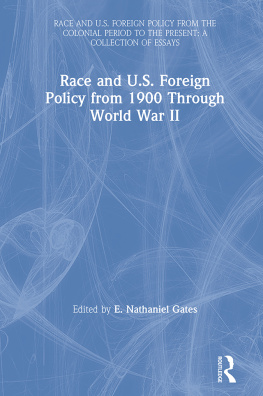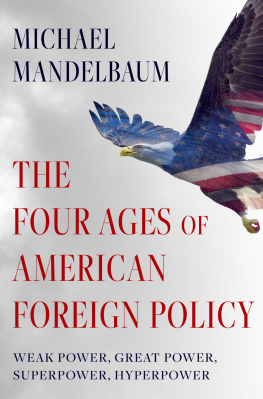First published 1999 by Garland Publishing, Inc.
Published 2016 by Routledge
711 Third Avenue, New York, NY 10017, USA
2 Park Square, Milton Park, Abingdon, Oxon OX14 4RN
Routledge is an imprint of the Taylor & Francis Group, an informa business
Introduction copyright 1999 Michael L. Krenn. All rights reserved.
Library of Congress Cataloging-in-Publication Data
The African American voice in U.S. foreign policy since World War II /
edited with an introduction by Michael L. Krenn.
p. cm.
Includes bibliographical references.
ISBN 0-8153-3418-4 (alk. paper)
1. United StatesForeign relations1945-1989Citizen participation. 2. United StatesForeign relations19451989 Social aspects. 3. Afro-AmericansPolitics and government. 4. RacismUnited StatesHistory20th century. 5. Imperialism History20th century. 6. DecolonizationHistory20th century. 7. Civil rights movementsUnited StatesHistory20th century. 8. United StatesRace relations. I. Krenn, Michael L., 1957E744.A29 1999
327.7300904dc21 99-27535
CIP
ISBN 13: 978-0-8153-3418-7 (pbk)
Following World War II, America was witness to two great struggles. The first was on the international front and involved the fight for freedom around the globe, as millions of people in Asia and Africa rose up to throw off their European colonial masters. In the decades following 1945 dozens of new nations joined the ranks of independent countries. At home, the civil rights movement continued to gather momentum throughout the late-1940s, 1950s, and into the 1960s. Discontented with their second-class citizenship, and believing that they had proven their worth during the war, African-Americans took various paths to achieve full equality in an American society long dominated by segregation and bigotry.
Not surprisingly, many African-Americans were among the first to discern connections between these two powerful struggles. African and Asian efforts to end white dominance of their nations resonated with African-Americans battling for the civil rights they had been promised since the end of the U.S. Civil War. When those nations achieved their independence and sent their representatives to the United Nations, black Americans took pride in the efforts. When the United States seemed to equivocate on its stance toward colonialism and edge toward support of its European allies, African-Americans were outspoken in their criticisms. The apartheid system of South Africa was equated with the Jim Crow system of the Deep South. The killings of protesters in Indonesia and South Africa and the colonial wars fought in Vietnam and Algeria were these so different from the lynchings of African-Americans in South Carolina and Alabama or the attacks on civil rights workers in Mississippi and Louisiana? For many African-Americans, the lines between Americas domestic policies and its foreign policy had blurred considerably, and the growing civil rights movement fueled black Americas interest in international affairs.
To be sure, the history of the African-American interest and involvement in U.S. foreign policy did not begin with the end of World War II. During much of the nineteenth century, particularly after the establishment of Liberia in the early 1800s, free blacks in the United States demonstrated a tremendous interest in the possibilities of African-American recolonization back to Africa. Even when interest in such schemes began to wane after the Civil War, many informed African-Americans kept their eyes on Africa, protesting European imperialism and arguing for greater U.S. support for Liberia.
Following the Civil War, the African-American voice in U.S. foreign affairs continued to grow. In the late nineteenth century, a few African-Americans such as Frederick Douglass even served as U.S. diplomats to the black republics of Liberia and Haiti. When America began its overseas thrust during the 1890s, African-American opinion was divided. Some supported the U.S. actions in Cuba and the Philippines, hoping to share in the new economic opportunities that were promised. Others were suspicious of American motives. Their own history in white-dominated America did not encourage optimistic visions of U.S. control of people of color in far-off lands. In the end, even those who had originally supported Americas imperialist ventures were disappointed and cynical. Jim Crow had merely been transplanted overseas, and at home African-Americans saw few benefits in America becoming a global power. More and more, African-Americans found themselves at odds with U.S. foreign policy. The differences could be seen clearly in the African-American and white American responses to the Boer War (18991902). While many whites in the general public supported the Boers (seeing their battle with the British as a classic David vs. Goliath saga), the U.S. government supported the British. The African-American response was more complex. At first viewing the conflict as a white mans war, most African-Americans came to support the British as the lesser of two evils, after learning of the extremist racial views of the Boer rebels. That rather lukewarm support evaporated after the war, as British racial policies in southern Africa quickly alienated African-Americans.
As during the late nineteenth century, African-Americans during the Progressive era continued to show interest in a number of foreign policy issues. The U.S. intervention in Haiti in 1915 stirred up a great deal of resentment and suspicions among American blacks. As World War I began, African-Americans found themselves in an uncomfortable situation: Should they demonstrate their patriotism by actively supporting a war that promised them no great benefit, or risk being branded as troublemakers by continuing to protest for their civil rights? They also continued their interest in African affairs, demonstrated most vividly by the work of Marcus Garvey and W.E.B. Du Bois in building a Pan-African movement in the United States.
The Italian invasion of Ethiopia in 1935 brought African-American interest in foreign affairs to its highest level thus far. The Italo-Ethiopian War convinced a growing number of African-Americans that race played a distinct role in the U.S. failure to react strongly to the sight of a European nation plundering one of the only independent black republics in Africa. When war broke out between the United States and Japan in 1941, African-Americans, of course, supported their nation in its time of need. However, the hysterical anti-Japanese reaction in the United States was questioned by some black Americans, who were quick to see the connections between the anti-Japanese campaign at home and their own battles against discrimination and the fight for racial equality.
Even during World War II, African-Americans became embroiled in diplomatic debates. The stationing of African-American troops in Britain caused constant problems and tensions. Here, the main issue was the strict segregation policy of the U.S. military and its conflict with the far less segregationist policies of the British public. The British did not want to offend the racial sensibilities of the white Americans, nor did it want to give effrontery to the black Americans based on their nations soil. With white demands for segregated facilities and black demands for equality of treatment, it was no surprise that several ugly incidents took place during the war.



